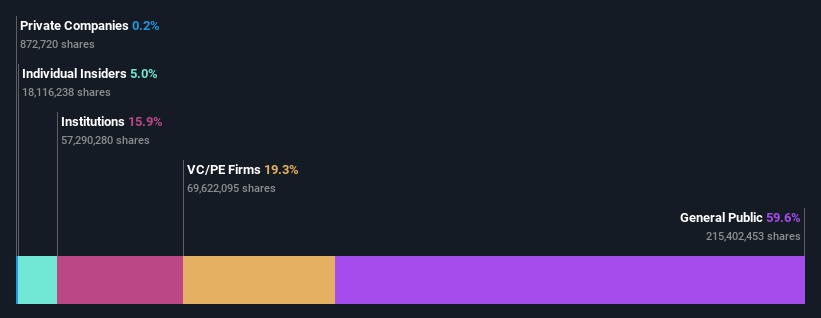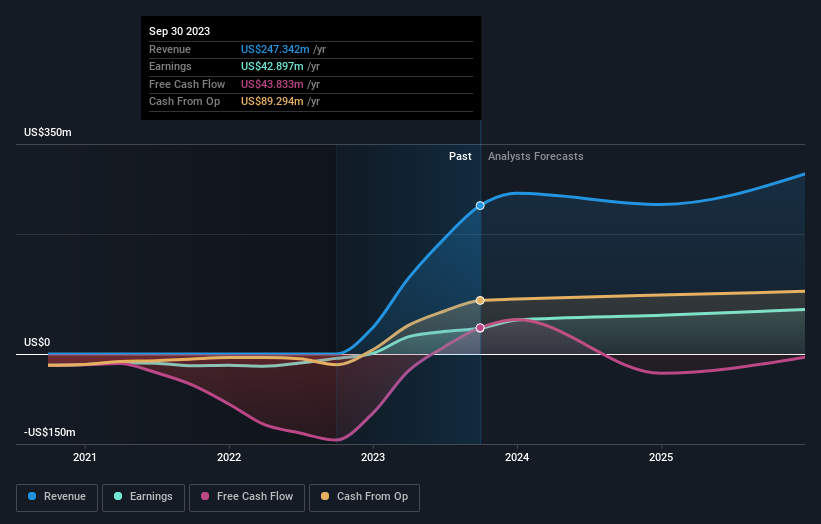Orezone Gold Corporation's (TSE:ORE) largest shareholders are retail investors with 60% ownership, private equity firms own 19%
Key Insights
The considerable ownership by retail investors in Orezone Gold indicates that they collectively have a greater say in management and business strategy
A total of 25 investors have a majority stake in the company with 40% ownership
Insiders have been buying lately
To get a sense of who is truly in control of Orezone Gold Corporation (TSE:ORE), it is important to understand the ownership structure of the business. And the group that holds the biggest piece of the pie are retail investors with 60% ownership. Put another way, the group faces the maximum upside potential (or downside risk).
Private equity firms, on the other hand, account for 19% of the company's stockholders.
Let's take a closer look to see what the different types of shareholders can tell us about Orezone Gold.
View our latest analysis for Orezone Gold

What Does The Institutional Ownership Tell Us About Orezone Gold?
Institutions typically measure themselves against a benchmark when reporting to their own investors, so they often become more enthusiastic about a stock once it's included in a major index. We would expect most companies to have some institutions on the register, especially if they are growing.
As you can see, institutional investors have a fair amount of stake in Orezone Gold. This implies the analysts working for those institutions have looked at the stock and they like it. But just like anyone else, they could be wrong. It is not uncommon to see a big share price drop if two large institutional investors try to sell out of a stock at the same time. So it is worth checking the past earnings trajectory of Orezone Gold, (below). Of course, keep in mind that there are other factors to consider, too.

We note that hedge funds don't have a meaningful investment in Orezone Gold. Looking at our data, we can see that the largest shareholder is RCF Management, LLC with 19% of shares outstanding. In comparison, the second and third largest shareholders hold about 4.8% and 4.3% of the stock. Furthermore, CEO Patrick Downey is the owner of 1.7% of the company's shares.
A deeper look at our ownership data shows that the top 25 shareholders collectively hold less than half of the register, suggesting a large group of small holders where no single shareholder has a majority.
While it makes sense to study institutional ownership data for a company, it also makes sense to study analyst sentiments to know which way the wind is blowing. There are a reasonable number of analysts covering the stock, so it might be useful to find out their aggregate view on the future.
Insider Ownership Of Orezone Gold
While the precise definition of an insider can be subjective, almost everyone considers board members to be insiders. Company management run the business, but the CEO will answer to the board, even if he or she is a member of it.
Most consider insider ownership a positive because it can indicate the board is well aligned with other shareholders. However, on some occasions too much power is concentrated within this group.
Shareholders would probably be interested to learn that insiders own shares in Orezone Gold Corporation. It has a market capitalization of just CA$293m, and insiders have CA$15m worth of shares, in their own names. It is good to see some investment by insiders, but it might be worth checking if those insiders have been buying.
General Public Ownership
The general public, mostly comprising of individual investors, collectively holds 60% of Orezone Gold shares. This level of ownership gives investors from the wider public some power to sway key policy decisions such as board composition, executive compensation, and the dividend payout ratio.
Private Equity Ownership
With an ownership of 19%, private equity firms are in a position to play a role in shaping corporate strategy with a focus on value creation. Some might like this, because private equity are sometimes activists who hold management accountable. But other times, private equity is selling out, having taking the company public.
Next Steps:
While it is well worth considering the different groups that own a company, there are other factors that are even more important. Consider risks, for instance. Every company has them, and we've spotted 2 warning signs for Orezone Gold you should know about.
If you would prefer discover what analysts are predicting in terms of future growth, do not miss this free report on analyst forecasts.
NB: Figures in this article are calculated using data from the last twelve months, which refer to the 12-month period ending on the last date of the month the financial statement is dated. This may not be consistent with full year annual report figures.
Have feedback on this article? Concerned about the content? Get in touch with us directly. Alternatively, email editorial-team (at) simplywallst.com.
This article by Simply Wall St is general in nature. We provide commentary based on historical data and analyst forecasts only using an unbiased methodology and our articles are not intended to be financial advice. It does not constitute a recommendation to buy or sell any stock, and does not take account of your objectives, or your financial situation. We aim to bring you long-term focused analysis driven by fundamental data. Note that our analysis may not factor in the latest price-sensitive company announcements or qualitative material. Simply Wall St has no position in any stocks mentioned.
